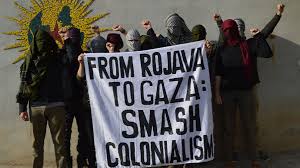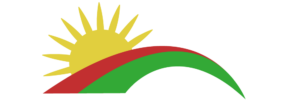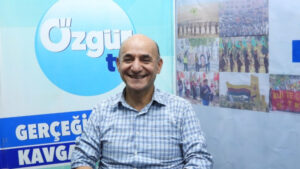Ever since two Israel flags were waved during a demonstration against the Turkish state’s renewed wave of attacks on Rojava on 27 October, the internet has been in an uproar.
On the one hand, we have the “anti-German” movement, which analyses the Kurds as Israel’s natural allies and has always seen Rojava and Israel as the only progressive projects in the Middle East. On the other side are the parts of the Palestine solidarity movement that are firmly convinced that the Kurdish liberation movement is a US-American, radical Zionist, proxy. Both parties, however different their views may be, feel massively confirmed in their world view by the videos circulating of Israeli flags in a sea of red, yellow and green.
The question of the frame of reference
People often like to talk about ‘the Kurds’ in such debates. Of course, ‘the Kurds’ are not a homogeneous group that thinks in the same way and holds the same opinion on absolutely every point. Even if there is a degree of organisation within the Kurdish people that is unique for our time with broad sections of the population openly supporting revolutionary ideas, there are of course also reactionary Kurds.
It goes without saying that there are also some Zionists among 40 million people, but this simple fact does not mean anything because just like Zionist Kurds, there are also Zionist Arabs, Persians and Turks.
It is therefore important to clarify which parts of the Kurdish people you are referring to in your analysis. For us, it is clear that our point of reference is always the progressive forces in a society. In the specific case of the Kurds, it is also the case that these forces represent the vast majority of the population and are enthusiastically supported by them.
In order not to go beyond the scope of a blog article, we will only be able to present the position of the PKK as by far the strongest force within the revolutionary movement of Kurdistan. All quotes used are taken directly from interviews with high-ranking PKK cadres after October 7. The full interviews are always linked so that readers can be sure that we are not taking anything out of context, but rather objectively reflecting the position of the PKK and the movement it leads. As a large number of Kurdish revolutionaries are mentioned by name in the course of the text, there is a list of persons at the end to avoid potential confusion.
Historical intertwining of the struggles
The Kurdish and Palestinian liberation struggles share a long common history. When a military coup loomed in Turkey in 1979, Abdullah Öcalan and a large part of the young PKK moved to Lebanon. The reason for this was the belief that the newly founded party was still too weak to withstand the conditions of the impending military dictatorship. The party would first have to grow and professionalise in order not to be nipped in the bud by fascism. This analysis turned out to be correct when the military actually staged a coup on September 12 1980 and subjected the entire revolutionary movement of Turkey and Northern Kurdistan to the most brutal repression. 650,000 political opponents were thrown into the torture prisons of the Turkish state, including those parts of the PKK that were still in the country.
The rest of the party set up a central party academy in the PLO-controlled areas of northern Lebanon. The site of the camp was made available to them by the Marxist Leninist DFLP. The logistics of the academy, for example the food supply, were also initially taken over by the DFLP. The most important aspect, however, is that the Palestinian resistance trained the PKK’s first guerrilla units here. Here in the plains of the Bekaa Valley, Palestinian freedom fighters laid the foundations for the armed resistance in Kurdistan that has now been going on for 40 years and without which a revolution in Rojava would have been inconceivable. This was an act of lived international solidarity that deeply impressed the PKK cadres and still influences them to this day. The member of the KCK[1] Executive Committee and co-founder of the PKK Duran Kalkan said the following last year:
“I, too, received my first basic training in Palestine and I am also a Palestinian guerrilla. I have expressed many times that I am always proud of this.”[2]
During the Israeli invasion of Lebanon in 1982, the PKK proved its own internationalist stance in practice by actively participating in the fight against the IDF. 10 PKK cadres lost their lives. The first PKK members to die in the armed struggle were therefore not murdered by the Turkish- but by the Israeli state. For anyone who wants to learn more about these people, we can warmly recommend the brochure of the International Commune of Rojava.[3]
Last April, the Executive Committee of the PKK once again emphasised the importance of this struggle:
‘Comrade Abdulkadir Çubukçu, who died on 1 May 1982 in Beirut fighting alongside the Palestinian people, reaffirms the historical brotherhood of the peoples of Palestine and Kurdistan”[4]
The Kurdish liberation movement has therefore been closely linked to the Palestinian struggle since its inception, and we will prove in the course of the text that this connection has not been broken to this day.
But the PKK also has a long history with the Israeli state. It should be emphasised in particular that the arrest of the Kurdish popular leader Abdullah Öcalan was only possible with the active assistance of the Mossad.[5] When Kurdish revolutionaries attempted to occupy the Israeli Consulate General in Berlin on 17 February 1999 in protest against this, the embassies security forces shot three people dead. The gunmen were flown out to Israel shortly afterwards without ever having to justify their triple murder.
Analysis of today’s conflict
But enough history now. How does the Kurdish movement analyse Israel and the current war today? After all, it has fundamentally changed its ideology in recent decades.
Let us first look at the, at least in in European discourse, highly controversial phrase of ‘genocide in Gaza’
Mustafa Karasu, a member of the KCK Executive Committee, says the following to the topic:
“What Israel is doing is genocide. We need to evaluate it like this.”[6]
Other high-ranking members of the movement also leave little room for interpretation in their statements. This includes the two co-chairmen of the KCK, Cemil Bayik and Besê Hozat:
“What is happening now against the Palestinian people is genocide.[7]” (Cemil Bayik) and “Genocides are being practiced, and gradually, this 3rd World War is intensifying and spreading, centered on Kurdistan, Palestine[8]”(Besê Hozat).
Duran Kalkan also emphasises that this genocide did not begin with the current war:
“Genocide has been practiced on the Palestinian people for 75 years. We are against this genocide and in favor of the legitimate rights of the Palestinian people.[9]
However, the criticism of the Israeli state is not limited to the fact that it is carrying out genocide. No, in various interviews it is made more than clear that they reject the Israeli state and the Zionist ideology as a whole. For example, Cemil Bayik said:
“The traditional aims of the state of Israel are clear. It is to erase the Palestinians from their historical territories. [10]”
and in an another interview:
“The state of Israel has always been striving to realize the goal envisioned by the Zionist ideology. According to this, the geography designated as Jewish land needs to be cleansed of any other communities, and it needs to be turned into a place inhabited entirely by Jews. This means the occupation of Palestine and the genocide of the Palestinian people, which is where all the problems originate. This idea has been the official policy of the Israeli state and its government.”[11]
Duran Kalkan formulates this even more drastically:
“Three years after the Second World War, the establishment of the State of Israel, again under the leadership of Britain, was completed and Israel was included in the hegemony war being waged in the region by the Turkish Republic. The aim of these two powers is to bring the Middle East under global capitalist hegemony. Undoubtedly, this is intended to be done on the basis of a racist-chauvinist-genocidal understanding and policy. This is based on the Armenian, Assyrian-Syriac, Greek and Kurdish genocides. Therefore, one of the founding aims of the State of Israel is to prevent the Kurdish people from being independent and free.[12]”
At this point at the latest, it should become clear that the idea of waving Israel flags at demonstrations of the Kurdish movement is simply absurd, because it is precisely this movement that analyses that the Israeli state is also largely built on the oppression of the Kurdish people. So even if you deny their internationalist character, it is still in their national interest as Kurds to reject the Israeli occupation.
Now that we have analysed the position of the movement towards the Israeli state in detail, let’s take a look at what the movement’s opinion on the Palestinian resistance is. Here too, the statements of the KCK leadership are anything but difficult to understand. As they do not require much categorisation in terms of their clarity, we will limit ourselves to presenting a selection of quotes here so that we can move on directly to the next segment of the text:
“The Kurdish people also need to emphasize their solidarity with the Palestinian people and continue their struggle in this solidarity approach” (KCK Exekutiv Komitee)[13]
“We have established friendship with the Palestinian people on the war fronts. Our movement and the Kurdish people have given the greatest support to the Palestinian resistance. We defend the just cause of the Palestinian people until the end.”[14] (Duran Kalkan)
“The cause of the Palestinian people is legitimate and nothing can deny the legitimacy of this cause. As the Kurdish Freedom Movement, we always stand by the just cause of the Palestinian people.”[15] (KCK Exekutiv Komitee)
The connection between Kurdistan and Palestine
‘Palestine Kurdistan – Intifada Serhildan’ is a slogan that regularly causes heated discussions in Germany. The anti-German newspaper ‘Jungle World’ , for example writes the following about it:
‘At demonstrations, they (meaning internationalist groups) shout ‘Palestine, Kurdistan – Intifada, Serhildan’ (in German: uprising) and parallel Palestinian acts of terror against Israelis with Kurdish uprisings against Turkish rule’[16]
According to Jungle World, when Kurds revolt against their oppressors, it is a heroic uprising against foreign rule, but when Palestinians do the same, it is an act of barbaric terrorism. A connection between the struggles is therefore unthinkable – after all, the Kurds are the ‘good guys’ and the Palestinians are the ‘bad guys’.
However, the Kurdish movement takes a fundamentally different approach to this issue. For them, both struggles are primarily anti-colonial struggles that have a common basis and are deeply intertwined. Due to their similar, interrelated situation, the Kurds and Palestinians are natural allies, according to the KCK.
“No one can understand the suffering of the Palestinian people more than the Kurds. No people can share a relationship of empathy more than the peoples of Palestine and Kurdistan. This has been proven by their experiences and joint struggle. It was as such yesterday and it is as such today.”[17] (Duran Kalkan)
The deep crisis in which the Middle East finds itself is based on the oppression of these two peoples and can only be ended by revolting against and sweeping away this oppression.
“There are two fundamental problems in the Middle East. One is the Palestinian question and the other is the Kurdish question. As long as these two problems are not solved, there will be war and massacres, and no space for freedom and democracy in the Middle East”[18](Cemil Bayik)
In order to achieve this goal, the two peoples must strengthen their friendship and expand their common struggle. The movement sees this step as necessary in order to achieve a revolutionary upheaval of conditions in West Asia.
“The Arabs were divided into 22 states and (..) the Kurds into 4 parts. It is these forces ( die Kräfte des Imperialismus zu denen sowohl die Türkei als auch Israel gezählt werden) that suck the blood of the Kurdish and Arab people. That is why the Kurdish and Arab people need to develop their alliance. If such an alliance is created, it can be a big step towards liberation.[19]” (Cemil Bayik)
In Rojava, this alliance is finding its most concrete expression to date. Kurdish and Arab revolutionaries are working side by side with numerous other ethnic groups to advance the development of self-administration on a daily basis and defend it militarily against any attacks. Even though there are no exact figures for the numerical ratio of the peoples in Rojava, it is assumed that there are now more Arabs than Kurds living in the areas of the self-administration. For more information on the role of Arabs in Rojava, we recommend the amazing brochure from the Rojava Information Centers: Beyond Rojava: North and East Syria’s Arab Regions.[20]
.
Perspective on solutions
It is therefore quite clear that the Kurdish movement is not exactly ideologically close to Zionism, and even a handful of reactionaries with Israel flags cannot change that. Nevertheless, let us take a look at the movement’s proposed solution to the war in Palestine. Since the PKK, analyses the state as a tool that stands in antagonistic contradiction to a free society, it naturally does not demand a Palestinian nation state. Neither a ‘two state solution’ nor a ‘one state solution’ is an option if you are convinced that states automatically oppress their populations.
The Party also repeatedly criticised Hamas for killing civilians and carrying out sexual violence around October 7.
What Hamas is doing is surely unacceptable [21] (Mustafa Karasu)
For them, the solution lies in their own ideology of democratic confederalism
Some people say that the solution for Palestine is a nation state (…) The solution is Rêber Apo’s philosophy, the paradigm he developed for humanity. Everyone should take this as a basis. This is the only way to solve the problems.[22] (Cemil Bayik)
This is certainly an approach that can be discussed, but that is not the subject of this article.
But to derive support for the Israeli state from this demand is simply absurd, especially in view of the positions outlined above.
For a consistent anti-colonial movement
The display of Israeli flags at Rojava demos is therefore in no way representative of the positions of the Kurdish liberation movement.
The oppression of Kurds and Palestinians are fundamentally related conflicts. Both the national question in Kurdistan and that in Palestine must be solved and they must be solved together! This has to be on the agenda of every organisation that sees itself as progressive. A consistently anti-colonialist worldview is the prerequisite for a successful internationalist struggle.
We would like to conclude with the words of Cemil Bayik, which read as if he wanted to address the flag bearers ofCologne and their anti-German fan base directly:
We clearly state that the peoples will definitely hold these genocidal states and mentality to account. We also strongly criticize and condemn the forces that stand by and support these genocidal policies of the Israeli state. (…) Everyone should take the right approach, no one should stand against the struggle of the peoples, especially the just causes of the Palestinian and Kurdish people.[23]
Peoples Bridge 29.11.2024
Abdullah Öcalan: Chairman and ideological mastermind of the PKK and the movement it leads. Has been in solitary confinement on the prison island of Imrali since February 1999,
Besê Hozat: Joined the guerrillas in the mountains of Dersim in 1994 and is now part of the PKK’s closest leadership circle. She has been co-chair of the KCK since 2013 and is on the Turkish state’s list of most wanted terrorists.
Cemil Bayik: Founding member of the PKK and one of its most prominent members. Also co-chairman of the KCK since 2013. Is on the Turkish state’s list of most wanted terrorists.
Duran Kalkan: Founding member of the PKK and influential theorist. Member of the KCK Executive Committee. He also spent several years in prison in Germany. He is on the Turkish state’s list of most wanted terrorists.
Mustafa Karasu: Deputy Chairman of the PKK and member of the KCK Executive Committee. Long-standing member of the PKK Politburo. He was imprisoned under Turkish torture several times. Is on the Turkish state’s list of most wanted terrorists.
Abdulkadir Çubukçu: Founding member of the PKK. Was killed by the IDF during the defence of Beirut.
[1] KCK (Koma Civakên Kurdistanê / Community of Kurdistan Societies) is the umbrella organisation of all groups that follow the ideology of the PKK, including the PKK itself All leading members of KCK are long-standing PKK members, often even founding members.
[2] https://kck-info.com/interviews-kalkan111123/
[3] tps://internationalistcommune.com/pkk-internationalists-in-the-palestinian-resistance/
[4] https://anfdeutsch.com/aktuelles/-41995
[5] https://anfdeutsch.com/hintergrund/die-hoelle-von-nairobi-und-die-kurdischen-aufstaende-22061
[6] https://kck-info.com/interviews-karasu141223/
[7] https://kck-info.com/interviews-bayik181123/
[8] https://kck-info.com/interviews140824/
[9] https://kck-info.com/interviews-kalkan312023/
[10] https://kck-info.com/interview-bayik-nov2123/
[11] https://kck-info.com/interview-bayik-nov2123/
[12] https://kck-info.com/interviews-kalkan111123/
[13] https://kck-info.com/statement-181023/
[14] https://kck-info.com/interviews-kalkan312023/
[15] https://kck-info.com/statement-131023/
[16] https://jungle.world/artikel/2024/27/islamisten-linke-auf-zu-vielen-hochzeiten-tanzen




